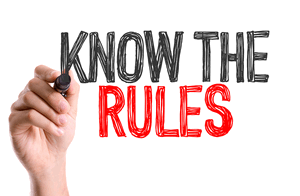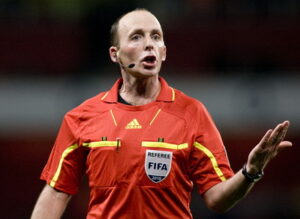 It is widely known that football players cannot place bets on football matches. Indeed, the rule is so stringent that players aren’t allowed to bet on anything to do with football as a sport, not just the matches that they’re involved with.
It is widely known that football players cannot place bets on football matches. Indeed, the rule is so stringent that players aren’t allowed to bet on anything to do with football as a sport, not just the matches that they’re involved with.
This makes sense, of course, given the extent to which they could be privy to information that the general public doesn’t have. Imagine a former teammate has gone to play for a club a couple of divisions below where they were before, but is telling the people they used to play with who will start games.
That is the sort of info that isn’t available to everyone, so it is only right that footballers are banned from taking advantage of it. The question is, can referees place wagers on games? The answer is the same as it is for players, insomuch as they are not allowed to bet on events in their sport, anywhere in the world.
That includes football related matters, such as betting on the next manager that a club will employ, where a certain player will be transferred to or something as seemingly benign as the team that a manager will select.
What The FA Rules Say
 When it comes to understanding whether or not a referee can place a bet on a football match, the best place to start is with the rules as they are laid out by the Football Association.
When it comes to understanding whether or not a referee can place a bet on a football match, the best place to start is with the rules as they are laid out by the Football Association.
The FA is the governing body for the sport in England, though the other FAs from around the United Kingdom, if not the world, have their own rules that tend to mirror those of the English Football Association. The rules, the FA says, are there to ‘preserve what is great in the beautiful game’, for which reasons they have been devised.
The idea is that the rules will ‘protect the integrity and future of football’. That is why they apply to ‘everyone involved in football’, not just players and coaches but ‘match officials and club staff’; though the FA doesn’t specify what is meant by ‘club staff’.
A worldwide ban has been put in place when it comes to betting on football, with he ban in place for those involved at the following levels of the game:
- Premier League
- English Football League
- National League
- FA Women’s Super League
- FA Women’s Championship levels
- Northern League
- Southern League
- Isthmian League
- All other participants in football
What The Ban Involves
 Knowing who is banned from betting on football is one thing, but understand what the ban actually involves is something else entirely. The worldwide ban prohibits everyone concerned with football from betting on any football match or football competition that is taking place anywhere in the world. The ban also extends to cover ‘any other football-related matter’, including but not limited to the transfer of players, the team selection of a manager, managerial appointments and so on. This ban stops people in the game from placing bets ‘either directly or indirectly’.
Knowing who is banned from betting on football is one thing, but understand what the ban actually involves is something else entirely. The worldwide ban prohibits everyone concerned with football from betting on any football match or football competition that is taking place anywhere in the world. The ban also extends to cover ‘any other football-related matter’, including but not limited to the transfer of players, the team selection of a manager, managerial appointments and so on. This ban stops people in the game from placing bets ‘either directly or indirectly’.
The Football Association specifically references ‘inside information’ when discussing the ban. That is why the ‘directly or indirectly’ part of the rule is so important. It means that players, referees and managers are unable to ask friends or family members, or even complete strangers, to place bets for them. Insider information is defined as something that someone might know because of their position but that is not readily available for the public to also know. The likes of injuries and team news falls into this category, which can then be used to figure out which team is more likely to win a game.
Such is the extent to which the FA takes insider information seriously, they will punish someone for passing on information even if they didn’t know that the person that they gave it to was going to place a bet. Info can be passed on by word of mouth, ‘social media postings’, email or writing. The only people that do not have to follow those rules are those involved Step 5 of the National League System or below, thought they still can’t bet on matches that they are involved in or that they can influence, or a football-matter relating to their league.
The Rules Specific To Referees
 When it comes to referees specifically, the Football Association says that the betting rules differ for any Match Officials, referees, referee assessors or coach that operate at Level 4 or below. They are still prohibited from passing on insider information and the same sort of rules apply when it comes to betting on matches in which they are involved or can influence.
When it comes to referees specifically, the Football Association says that the betting rules differ for any Match Officials, referees, referee assessors or coach that operate at Level 4 or below. They are still prohibited from passing on insider information and the same sort of rules apply when it comes to betting on matches in which they are involved or can influence.
In other words, a referee in Level 4 or below in the English Football League pyramid could have a wager on Liverpool versus Manchester United, but would be forbidden from betting on their own league.
The FA offers advice to Match Officials on betting and the rules and regulations around it as an activity. They point out that it isn’t just players that might be approached to fix games or ‘incidents within games’, with Match Officials also susceptible to such approaches.
The Football Association has put systems in place in order to allow Match Officials to take action if they were to become aware or suspicious activity around a match. This can include going so far as to replace the Match Officials before a game gets underway, if needs be.
Bias From Match Officials
| Referee | Team Supported | Home Town |
|---|---|---|
| Andre Marriner | Aston Villa | Birmingham |
| Anthony Taylor | Altrincham | Manchester |
| Chris Kavanagh | Unknown | Manchester |
| Craig Pawson | Sheffield United | Sheffield |
| Graham Scott | Swindon Town | Oxford |
| Jon Moss | Sunderland | Sunderland |
| Kevin Friend | Bristol City / Leicester City | London |
| Lee Mason | Bolton Wanderers | Bolton |
| Martin Atkinson | Leeds United | Bradford |
| Michael Oliver | Newcastle United | Ashington |
| Mike Dean | Tranmere Rovers | Wirral |
| Stuart Atwell | Luton Town | Nuneaton |
There is a sense that referees and other match officials should be strong enough not to be influenced when officiating a match. That is why the Professional Game Match Officials Limited appointments for referees will often see those from Manchester able to take on the responsibility of refereeing matches involving teams from Manchester and Merseyside.
The PGMOL believes that the only matches that referees should not take charge or are those involving the teams that they support, which is why refs need to say who they support in advance of being appointed to the biggest matches.
According to the information that is in the public domain, the table above shows a list of referees that support certain teams, including their home town.
For a long time, Mike Dean wasn’t allowed to officiate matches that featured either Liverpool or Everton because he is from the Wirral, which is geographically close to Liverpool. That eventually changed, initially when he was allowed to referee the Merseyside derby before eventually taking charge of either Liverpool or Everton matches against different opposition. As with the likes of Anthony Taylor and Manchester-based clubs, however, this doesn’t sit right with a lot of people. Regardless of the team that they support, there’s no question that they run the risk of being influenced by friends and neighbours.
You might well wonder what this has to do with betting, but it doesn’t take a great leap of the imagination to wonder whether a referee that isn’t allowed to place bets for fear or influencing the outcome of a match for their own financial benefit might also see their way to ensuring one result over another in order to see the team that they support benefit. Likewise, might a referee from Manchester who is friends with a United or City supporter not think twice before awarding a penalty against either team for fear of upsetting their friend and having to face them when they go out for a pint in their local?
The Football Association’s strict rules around betting make complete sense, but it is odd that such a strict approach isn’t taken by the PGMOL when it comes to the awarded of certain matches to different officials. There are countless referees from Greater Manchester operating in the Premier League, for example, yet none of them happen to support the biggest club from the city. That is curious, to say nothing of the fact that people from Manchester are brought up to hate those from Liverpool and vice-versa. Should such officials from one city be allowed to referee matches involving teams from the other, using the same logic as the betting ban?
The Curious Case Of Mike Dean
 When discussing referees and betting, it is worth looking at the curious case of Mike Dean from back in 2005. Dean was due to take charge of a game between Newcastle United and Bolton Wanderers at St. James’ Park, only for the PGMOL to suspend him indefinitely and launch an investigation into him after it emerged that he was involved with Arbitros Racing. That was a betting website, on which punters are given advice on how they should bet on horses in order to try to win money when getting the calls right.
When discussing referees and betting, it is worth looking at the curious case of Mike Dean from back in 2005. Dean was due to take charge of a game between Newcastle United and Bolton Wanderers at St. James’ Park, only for the PGMOL to suspend him indefinitely and launch an investigation into him after it emerged that he was involved with Arbitros Racing. That was a betting website, on which punters are given advice on how they should bet on horses in order to try to win money when getting the calls right.
A spokesperson for Professional Game Match Officials Limited said, “Mike Dean has been suspended indefinitely. He is a public figure, and certain standards are expected of him. People here have looked at what he is doing. The board of the Professional Game Match Officials Ltd have suspended referee Mike Dean with immediate effect after receiving information regarding his involvement in an on-line racehorse syndicate. The board will now investigate whether Mike Dean has breached his employment contract with PGMO, which requires officials to notify and seek approval of various other activities – including additional employment or the use of their status as a PGMO official for promotional purposes.”
Whilst there was no suggestion that Dean was betting on football or placing wagers that might influence the outcome of football games or use inside information, his very involvement with a betting company was enough to mean that the PGMOL felt that it was right to suspend him. That, perhaps, gives you an insight into how seriously the game takes gambling as an activity, even if it was nearly two decades ago that it happened. This was summed up when the statement concluded, “The board has taken this prompt action to protect all parties concerned, and it is right that Mike Dean should not officiate until this matter is resolved to the board’s satisfaction.”
It is not the same as the case of Tim Donaghy in the United States of America, who got rich from betting on basketball games that he officiated. Having spent four seasons refereeing Continental Basketball Association Games, he was promoted to the National Basketball Association. Soon he began to place bets with friends, then an old classmate, James Battista, decided that he wanted in on the action, paying Donaghy $2,000 per game for insider information. Eventually he got found out by the FBI and was sentenced to 15 months in prison. Dean, at least, was only betting on horses.